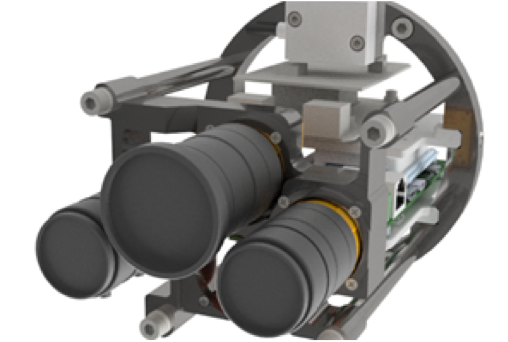Autonomous Cargo Handling and Transportation
The Norwegian Research Council granted VOCA and partners 12,9 MNOK to develop the next-generation logistical autonomy. The project started November 2020 and was finalised end of 2023. The project goal was to develop technology to interconnect cranes, fork-lifts, reach stackers and drones to create a safer and more effective logistical operation.
Technology

Handling and transportation of goods is a manual process with great operational risk. Goods handling at ports and logistics hubs require large teams of workers, and is dangerous and prone to human error. For a typical logistics hub or port, 50-60% of the total costs are related to labour. Accidents and work-related injuries are common, and in the period 2009-2014 in Norway, the following industries represent 67% of the total casualties; construction industry (59), transportation and logistics (44), agriculture and fishing (43) and industry in general (33).
By remotely controlled & autonomous handling and transportation of goods, calculations show that it is possible to reduce labour costs with 40% to 60%, and almost completely remove accidents causing casualties and work-related injuries. Increased use of remote control & autonomy enables increased competitiveness despite high labour cost. Drones for priority-deliveries to e.g. offshore sites will increase efficiency and reduce CO2 emissions.
We aim to develop a technology in form of software, sensors and compute devices that will function as the “eyes, senses and brain” turning forklifts, reach stackers, drones and cranes into smart, collaborative devices. This will allow manually- and autonomously controlled transportation devices to interact in uncontrolled environments with self-awareness, smart AI perception of the surroundings, including machine-to-machine communication.
More specifically, the project aimed to develop perception- and robotic control technology through computer vision and artificial intelligence, allowing autonomous control and interaction of cranes, forklifts, reach stackers and drones, thus enabling autonomous handling of goods.
The VOCA Software Platform was updated with the new developments during the project execution. The solutions and technology developed during the project may be retrofitted to existing machines and integrated into the existing infrastructure, without the need for significant investments, thus enabling economic growth while contributing to circular economy for existing ports, quays and logistic hubs.
Project partners are University of Zaragoza and Aersea.
Official project-information from the Research Council of Norway is available on this link.
Please reach out if you are interested in discussing how the results from the project can benefit you and your organization.